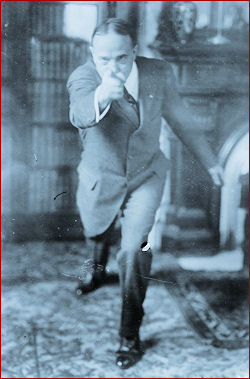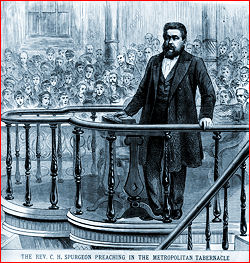What mediocre preacher said this?
It is a long time since I preached a sermon that I was satisfied with. I scarcely recollect ever having done so.If you didn't suspect a trick-question, you might speculate, "You, DJP?" — a fair and appropriate guess. But no, the mediocre preacher was Charles Haddon Spurgeon, in a sermon titled "Good Earnests of Great Success," preached in 1868 (thanks to Dave Harvey, whose post brought this to my attention).
Spurgeon goes on:
You do not know, for you cannot hear my groanings when I go home, Sunday after Sunday, and wish that I could learn to preach somehow or other; wish that I could discover the way to touch your hearts and your consciences, for I seem to myself to be just like the fire when it wants stirring; the coals have got black when I want them to flame forth.
If I could but say in the pulpit what I feel in my study, or if I could but get out of
my mouth what I have tried to get into my own soul, then I should preach indeed, and move your souls, I think. Yet perhaps God will use our weakness, and we may use it with ourselves, to stir us up to greater strength. You know the difference between slow motion and rapidity. If there were a cannon ball rolled slowly down these aisles, it might not hurt anybody; it might be very large, very huge, but it might be so rolled along that you might not rise from your seats in fear. But if somebody would give me a rifle, and ever so small a ball, I reckon that if the ball flew along the Tabernacle, some of you might find it very difficult to stand in its way. It is the force that does the thing.
So, it is not the great man who is loaded with learning that will achieve work for God; it is the man, who, however small his ability, is filled with force and fire, and who rushes forward in the energy which heaven has given him, that will accomplish the work—the man who has the most intense spiritual life, who has real vitality at its highest point of tension, and living, while he lives, with all the force of his nature for the glory of God. Put these three or four things together, and I think you have the means of prosperity. [Paragraph breaks added]Were I interviewed on truths that loom larger and larger over the decades, particularly regarding preaching, I know what would come near the top. It is this: the centrality and native impotence of preaching.
No reader of Pyromaniacs will need convincing of the former. It is the "preacher" who brings the word that saving faith requires (Romans 10:14, 17), and through the folly of what we preach that God saves sinners (1 Corinthians 1:21). Our paramount and awesome imperative, as pastors, is to "Preach the Word" regardless of opposition (2 Timothy 4:2, with context).
How, then, can I speak of the impotence of preaching?
My readiest answer is "From experience!" But let me back up. As a young Christian man and a beginning preacher, so high was my estimate of the Word of God that I virtually saw it as a magic book. Here's what I mean: Hebrews 4:12 was a central verse, with its declaration that "The word of God is living and effective and sharp beyond any two-edged sword," piercing where nothing else can reach. There it is. That book is full of divine power.
I still utterly believe that, more than ever. But the way I rather expected it to work was virtually ex opere operato. That is, you preach the Word, and wonderful things happen. Every time. Kazingo. Just by doing it. Because the Word is so inherently powerful.
 As with all error, there is truth in all of that. Something does happen. Both preacher and hearer now stand under the testimony of God. It counts. Whether we repent or reject, whether we mourn or mock, whatever our response, God has spoken. He is on record; and His speaking to us is on our record.
As with all error, there is truth in all of that. Something does happen. Both preacher and hearer now stand under the testimony of God. It counts. Whether we repent or reject, whether we mourn or mock, whatever our response, God has spoken. He is on record; and His speaking to us is on our record.But what was not prominent enough in my thinking was the absolutely and constantly essential ministry of the Triune God, whether the hearers are saved or unsaved. The work of conversion, of blessing, of edification, completely and utterly depends on God attending, using, and applying His word with power (cf. 1 Thessalonians 1:5; 2:13).
Consider this: Paul preached Christ. Lydia believed. Yay, there you have it, Hebrews 4:12! Yes indeed — but other ladies present did not believe. Uh-oh. Why not? Because "the Lord opened [Lydia's] heart to pay attention to what was said by Paul" (Acts 16:14b), and He did not do that for the others who heard the exact same preaching.
Was the fault Paul's? Had he done a better job, given a better altar-call, furnished a glossier Anxious Bench, could he have produced more responses? Well, maybe so; but he couldn't have opened more hearts.
This is the vital and indispensable element: the work of God behind, in, with, above, through, and often despite our preaching. It is the vital element, and it is the element we cannot control or produce by formula. We can only plead and beseech Heaven, that God would move His hand, and work to His glory.
 Until and unless that happens, we are like Elijah on Mt. Carmel. By the very best of our preparation and passion, we can lay plenty of wood. And by our innumerable flaws and idiocies and patheticalities, we will surely drench the wood with abundant water.
Until and unless that happens, we are like Elijah on Mt. Carmel. By the very best of our preparation and passion, we can lay plenty of wood. And by our innumerable flaws and idiocies and patheticalities, we will surely drench the wood with abundant water.But the fire?
That must come from Heaven, or it will not come at all.
This is a truth that Charles Spurgeon, probably the greatest preacher ever to use the English language, grasped and believed. John Stott (no slouch as a preacher) relates the story that Spurgeon, as he climbed the steps to his pulpit, regularly repeated over and over "I believe in the Holy Ghost, I believe in the Holy Ghost."
So must we, consciously and in great, pleading, abject dependence.
How? I'll close with a few specific exhortations:
- The pastor himself must pray as he works on his sermon. I knew a preacher who would not prepare at all, because he felt that the Holy Spirit needed to give him the word on the spot. I wondered, "Couldn't the Holy Spirit have helped you on Monday, and Tuesday, as you worked on a message?" Of course He can, and does.
- The pastor himself should pray for the work of God before, during, and after the delivery of the sermon. I confess I am still learning this...along with everything else worth learning.
- But the congregation must also join in. Paul often pled for his converts' and readers' prayers for his ministry of the Word (cf. Colossians 4:3-4; 2 Thessalonians 3:1). So attend your church's midweek prayer meeting, and join your brothers and sisters in opening your mouth in prayers for conversions, for conviction, for instruction, for transformation through the ministry of the Gospel and Word. Then on Sunday, take time before the service starts to find your seat and begin praying for yourself and others, for your pastor, and for the effective ministry of the Word.
But no, think again. Do not imagine that even the very best preacher's sermon will accomplish any more than a snowball in the Sahara, apart from the hand of God on it. And that's where you are called to come in, and wrestle alongside him in your prayers (Romans 15:30; 2 Corinthians 1:11).
Paul knew it, Spurgeon knew it. Let us know it as well.













10 comments:
Wow that was really great to read. I'm overwhelmed by my prayerlessness in regards to this! Thanks for the needed correction!
I'm obviously not a preacher but your post reminded me of a quote from Grace Abounding to the Chiefest of Sinners by John Bunyan. This passage jumps to my mind when I go to hear some preachers. Bunyan is describing his early preaching here:
"In my preaching of the Word, I took
special notice of this one thing, namely, that the
Lord did lead me to being where his Word
begins with sinners; that is, to condemn all
flesh, and to open and allege that the curse of
God, by the law, doth belong to, and lay hold
on all men as they come into the world, because
of sin. Now this part of my work I fulfilled with
great sense; for the terrors of the law, and
guilt for my transgressions, lay heavy on my
conscience. I preached what I felt, what I
smartingly did feel, even that under which my
pour soul did groan and tremble to
astonishment.
Indeed I have been as one sent to them
from the dead; I went myself in chains to
preach to them in chains; and carried that fire
in my own conscience that I persuaded them to
beware of. I can truly say, and that without
dissembling, that when I have been to preach, I
have gone full of guilt and terror even to the
pulpit door, and there it hath been taken off,
and I have been at liberty in my mind until I
have done my work, and then immediately,
even before I could get down the pulpit stairs, I
have been as bad as I was before; yet God
carried me on, but surely with a strong hand,
for neither guilt or hell could take me off my
work.
Roger - the inly reason I let your comment out of the filter was that I think it demonstrates exactly what is wrong with most theological reasoning: opinion and preferences elevated above biblical truth and serious deliberation.
In the view you are outlining here, only a church with one leader who is obeyed without any room for his fallibility or the love of other people could be the true church. That's not at all what the Bible indicates, and you will do well to think harder about it.
And people ask why I don't write more often.
smh
I'm not the one who said this, Roger:
" I believe that organizational unity, and even its public declarations within movements and denominations, is a mandatory obligation to the rest of Christ's body so that we can more readily come to the perfect unity of faith."
You are.
Have a nice day.
The "ridiculous end times scenario" was just in the US of A, spewing heretical bile in all his Antichristal glory.
And now back to the current post...
Yes, a second comment discernibly on the original post would be nice.
I have greatly benefited from THIS post this week in that I have prayed for my pastor more than usual and also reached out to see how he was doing without asking him to do anything for me. I feel like I am not taking seriously enough the warfare he is facing while overseeing my soul. Hopefully, I will be reminded of this frequently so I don't forget the lesson learned!
This post - this actual post, written right here - seems to be addressing two ditches. On the one side you have the Bible as magic spellbook, where you say the right words for the incantation and - BAM - regeneration! BAM - sanctification! (Just make sure you say the right words.) Confidence in the inherent power of God's word can almost sort of resemble a Word Faith Lite - I said the right words, why did the right results not come?
The other ditch is the same one that comes up whenever God's sovereignty is involved - the fatalism ditch. If God brings the results, why does it matter what I preach? And yet, as with evangelism, our duty is to faithfully proclaim. It is surely a sign of our sinful arrogance that if we can't control the results, we don't care about the means.
I'd note also the temptation to manipulative means that arises. As Paul could attest, faithful straightforward preaching of the same message could produce a great harvest one place, and a stoning somewhere else. If only there was some way to guarantee the results we want! And so the foolish message of the cross gets dressed up with (and eventually replaced by) dancing stormtroopers and free Mountain Dew and shenanigans beyond your worst imagination.
The remedy, as pointed out so well, is faithful ministry of the word as God commands, which God and God alone can make effective. The reminder to those of us in the congregation is vital. Are we content with faithful ministry, even if we don't see the results we would like, even if it brings suffering? Are we committed to pray as Paul sought prayer for his ministry?
Good stuff. You should write more.
The preachers responsibility is to sow or water the seed, which is the Word of God, but the preacher doesn't get the luxury of choosing what type of ground the seed lands on. The Word will accomplish that where unto it is sent. Paul plants and Apollos waters, God gives the increase.
In His Service,
Franklin Whittenburg
Post a Comment